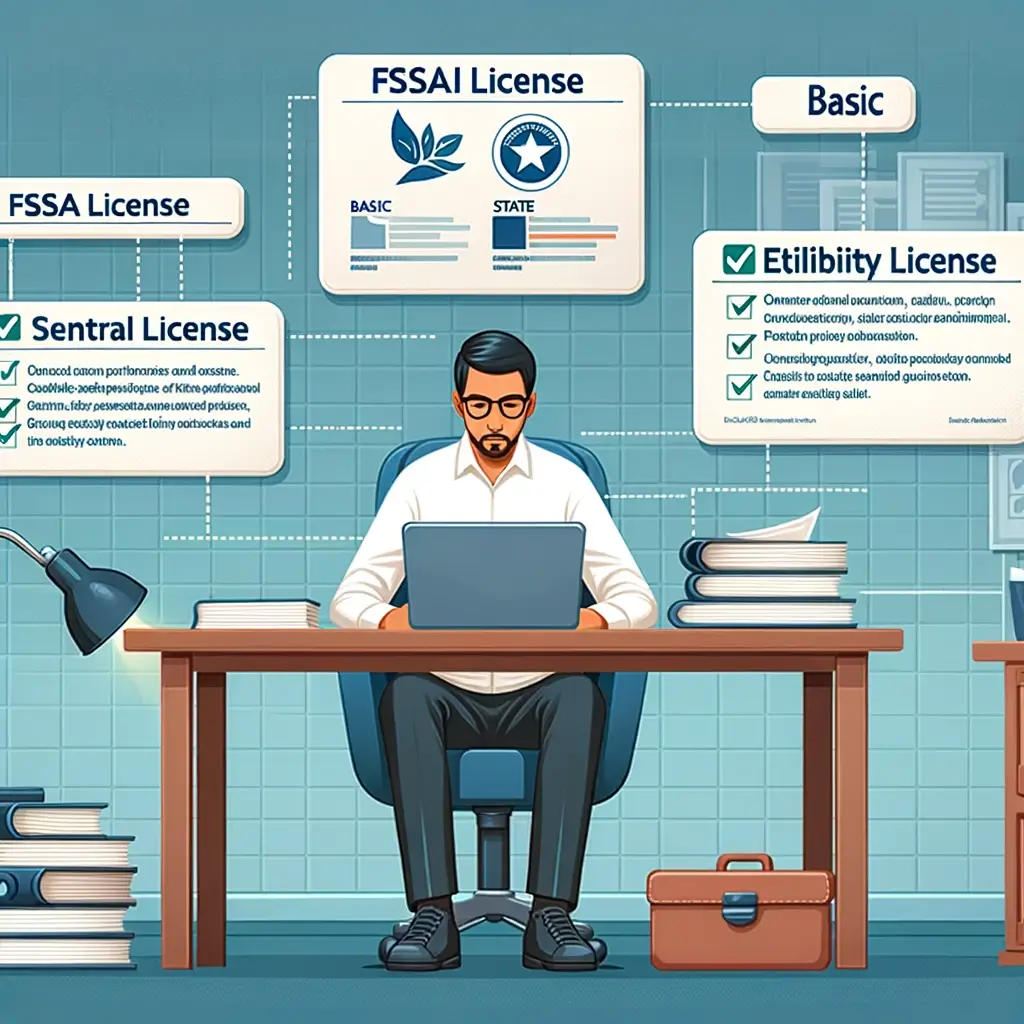
The Food Safety and Standards Authority of India (FSSAI) plays a critical role in regulating the food industry in India. By ensuring the quality and safety of food products, FSSAI helps protect public health and maintain standards across the sector. One key aspect of compliance is obtaining the correct FSSAI license. This article provides a complete guide to the types of FSSAI licenses available and the eligibility criteria for each.
Types of FSSAI Licenses
There are three main types of FSSAI licenses: Basic Registration, State License, and Central License. Each type has its own eligibility criteria and scope of applicability.
1. Basic Registration
- Eligibility Criteria: Basic registration, also known as Petty FSSAI Registration, is suitable for small-scale food businesses with an annual turnover of up to Rs. 12 lakhs.
- Scope: It is applicable to petty food manufacturers, food retailers, itinerant vendors, temporary stall holders, and small-scale food production units.
- Process: The process involves filling out Form A (application) and submitting it to the local food safety department.
2. State License
- Eligibility Criteria: A State FSSAI License is mandatory for medium-sized food businesses with an annual turnover between Rs. 12 lakhs and Rs. 20 crores.
- Scope: This license is suitable for manufacturers, food processors, and traders within the specified turnover range.
- Process: The process involves filling out Form B (application) and submitting it along with the necessary documents to the State Licensing Authority.
3. Central License
- Eligibility Criteria: A Central FSSAI License is mandatory for large food businesses with an annual turnover above Rs. 20 crores.
- Scope: This license is for large manufacturers, food importers, exporters, and businesses operating in multiple states.
- Process: The process involves filling out Form B (application) and submitting it along with the required documents to the Central Licensing Authority.
How to Determine Which License You Need
Determining which FSSAI license you need depends on the nature and scale of your food business. Follow these guidelines:
- Turnover: Identify your annual turnover and match it with the relevant license type.
- Type of Business: Consider the type of food business you operate—manufacturing, processing, trading, etc.—to ensure you apply for the appropriate license.
- Location: Businesses operating in multiple states may need a Central License, while those operating within one state may only need a State License.
Required Documents for FSSAI License Application
Regardless of the type of FSSAI license, certain documents are required during the application process:
- Identity and Address Proof: Documents such as Aadhaar card, PAN card, or utility bills.
- Business Details: Documents detailing the type of business, turnover, and ownership.
- Food Safety Management Plan: Outline your plan for maintaining food safety and quality standards.
- Other Documents: Depending on the type of license, additional documents such as manufacturing unit layout, food safety management system certificate, and others may be required.
Conclusion
Obtaining the correct FSSAI license for your food business is essential to ensure compliance with regulations and maintain food safety standards. By understanding the types of licenses available and their eligibility criteria, you can make informed decisions for your business. Always ensure to keep your FSSAI license current and comply with any regulations to avoid penalties and ensure the success of your food business.
Q.Who needs an FSSAI license?
Q.What are the different types of FSSAI licenses?
Q.What is Basic FSSAI Registration?
Q.What is a State FSSAI License?
Q.What is a Central FSSAI License?
Q.What documents are required to apply for an FSSAI license?
Q.How do I apply for an FSSAI license?
Q.How long does it take to receive an FSSAI license?
Q.What are the consequences of not obtaining an FSSAI license?
Q.Can I operate my food business while my application is pending?
Q.Is the FSSAI license transferable?
Q.How often do I need to renew my FSSAI license?
Q.Can I upgrade my FSSAI license?
Q.What happens if my application for an FSSAI license is rejected?